Case Study: Ethical and Legal Issues in Home Health Assistance
VerifiedAdded on 2023/06/08
|7
|1505
|276
Case Study
AI Summary
This case study addresses misconduct by a home health aide, Nicole, who failed to report hazardous living conditions and accepted a bribe, leading to a patient's deteriorating health. The analysis identifies violations of ethical principles like beneficence and transparency, as well as tort law. It considers cultural values and the impact of interventions on patients and healthcare providers. Recommendations include regular feedback reports from aides and random field visits to ensure patient welfare and accountability. Consequences for misconduct are outlined, ranging from warning letters to termination. Desklib offers access to similar case studies and study tools for students.
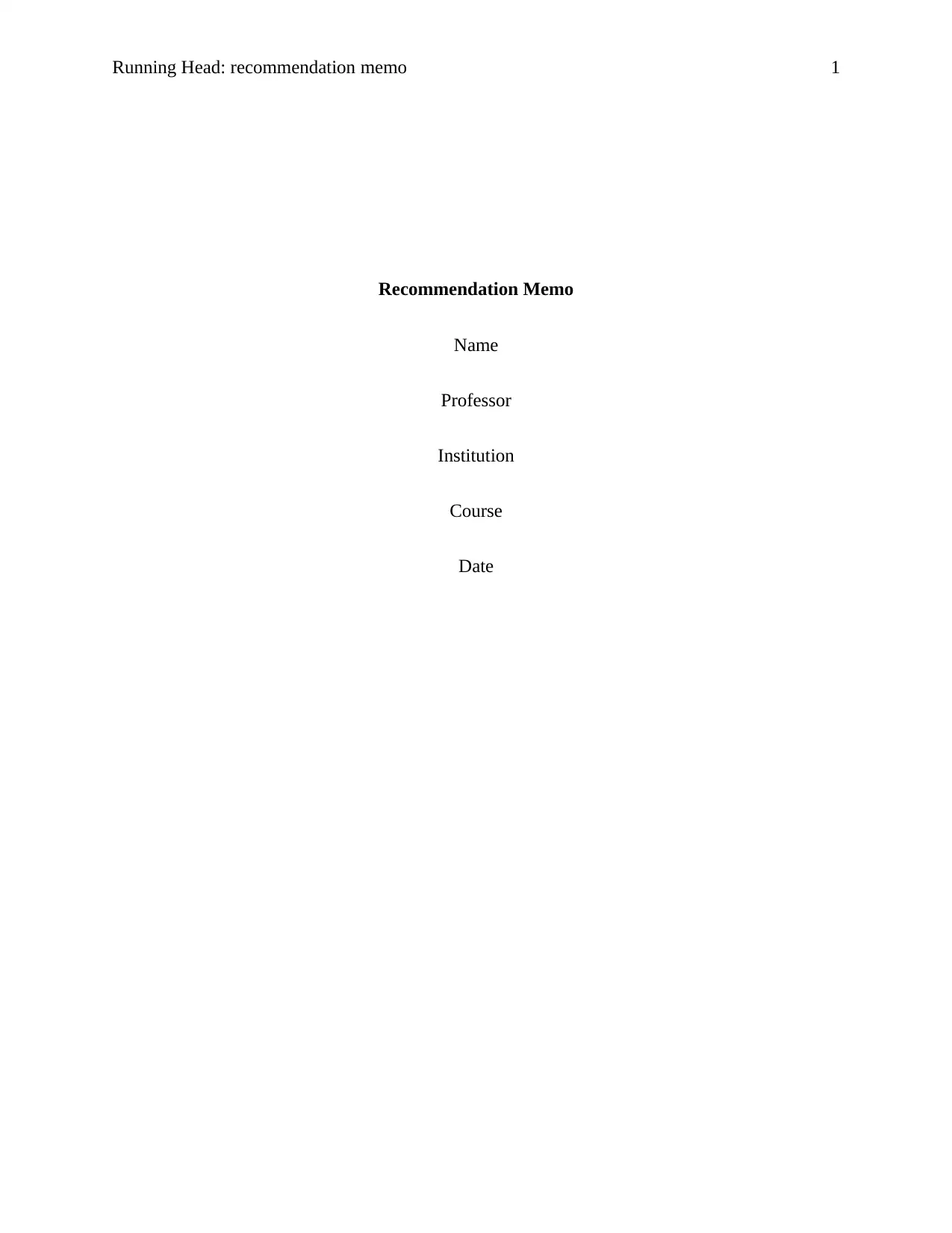
Running Head: recommendation memo 1
Recommendation Memo
Name
Professor
Institution
Course
Date
Recommendation Memo
Name
Professor
Institution
Course
Date
Paraphrase This Document
Need a fresh take? Get an instant paraphrase of this document with our AI Paraphraser
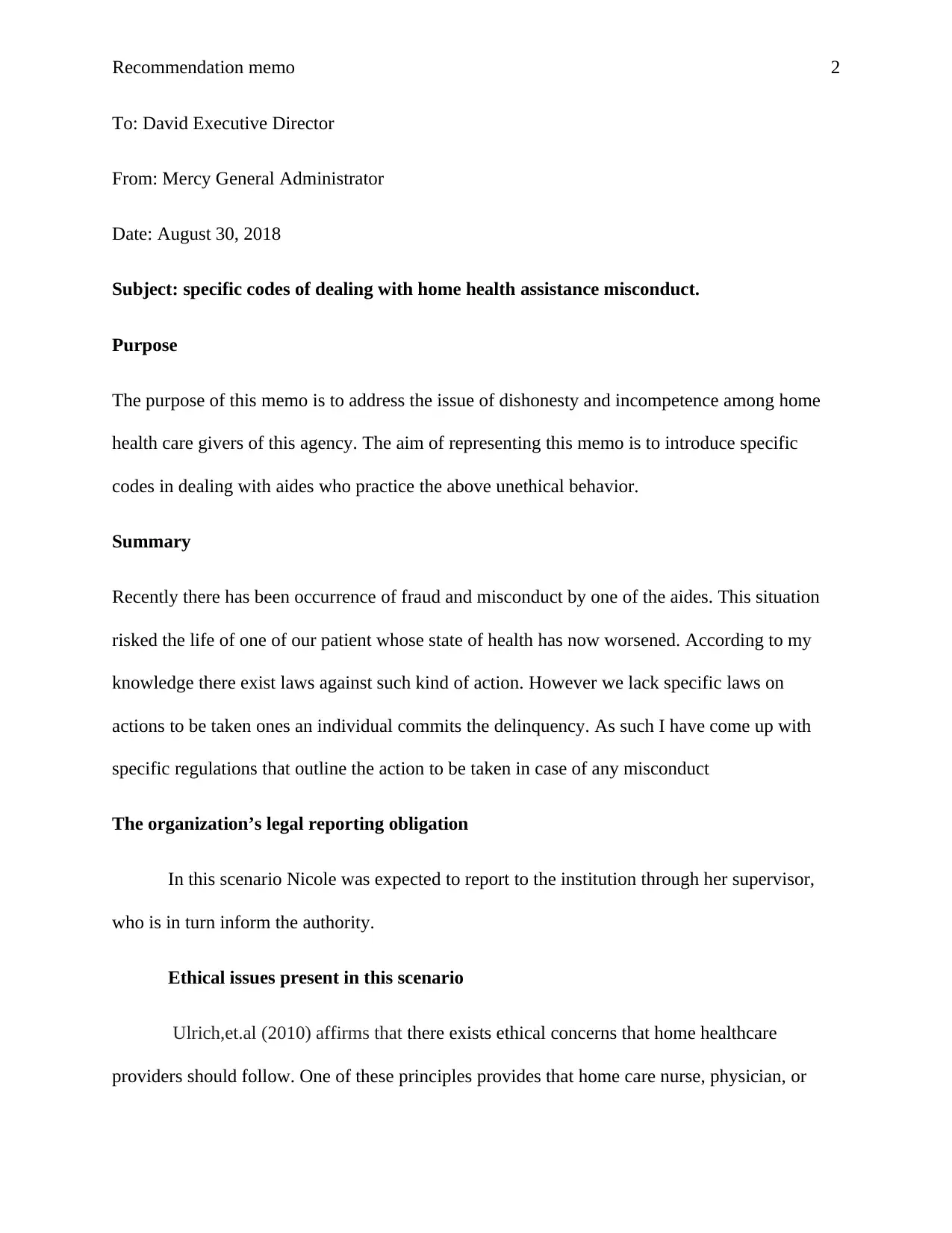
Recommendation memo 2
To: David Executive Director
From: Mercy General Administrator
Date: August 30, 2018
Subject: specific codes of dealing with home health assistance misconduct.
Purpose
The purpose of this memo is to address the issue of dishonesty and incompetence among home
health care givers of this agency. The aim of representing this memo is to introduce specific
codes in dealing with aides who practice the above unethical behavior.
Summary
Recently there has been occurrence of fraud and misconduct by one of the aides. This situation
risked the life of one of our patient whose state of health has now worsened. According to my
knowledge there exist laws against such kind of action. However we lack specific laws on
actions to be taken ones an individual commits the delinquency. As such I have come up with
specific regulations that outline the action to be taken in case of any misconduct
The organization’s legal reporting obligation
In this scenario Nicole was expected to report to the institution through her supervisor,
who is in turn inform the authority.
Ethical issues present in this scenario
Ulrich,et.al (2010) affirms that there exists ethical concerns that home healthcare
providers should follow. One of these principles provides that home care nurse, physician, or
To: David Executive Director
From: Mercy General Administrator
Date: August 30, 2018
Subject: specific codes of dealing with home health assistance misconduct.
Purpose
The purpose of this memo is to address the issue of dishonesty and incompetence among home
health care givers of this agency. The aim of representing this memo is to introduce specific
codes in dealing with aides who practice the above unethical behavior.
Summary
Recently there has been occurrence of fraud and misconduct by one of the aides. This situation
risked the life of one of our patient whose state of health has now worsened. According to my
knowledge there exist laws against such kind of action. However we lack specific laws on
actions to be taken ones an individual commits the delinquency. As such I have come up with
specific regulations that outline the action to be taken in case of any misconduct
The organization’s legal reporting obligation
In this scenario Nicole was expected to report to the institution through her supervisor,
who is in turn inform the authority.
Ethical issues present in this scenario
Ulrich,et.al (2010) affirms that there exists ethical concerns that home healthcare
providers should follow. One of these principles provides that home care nurse, physician, or
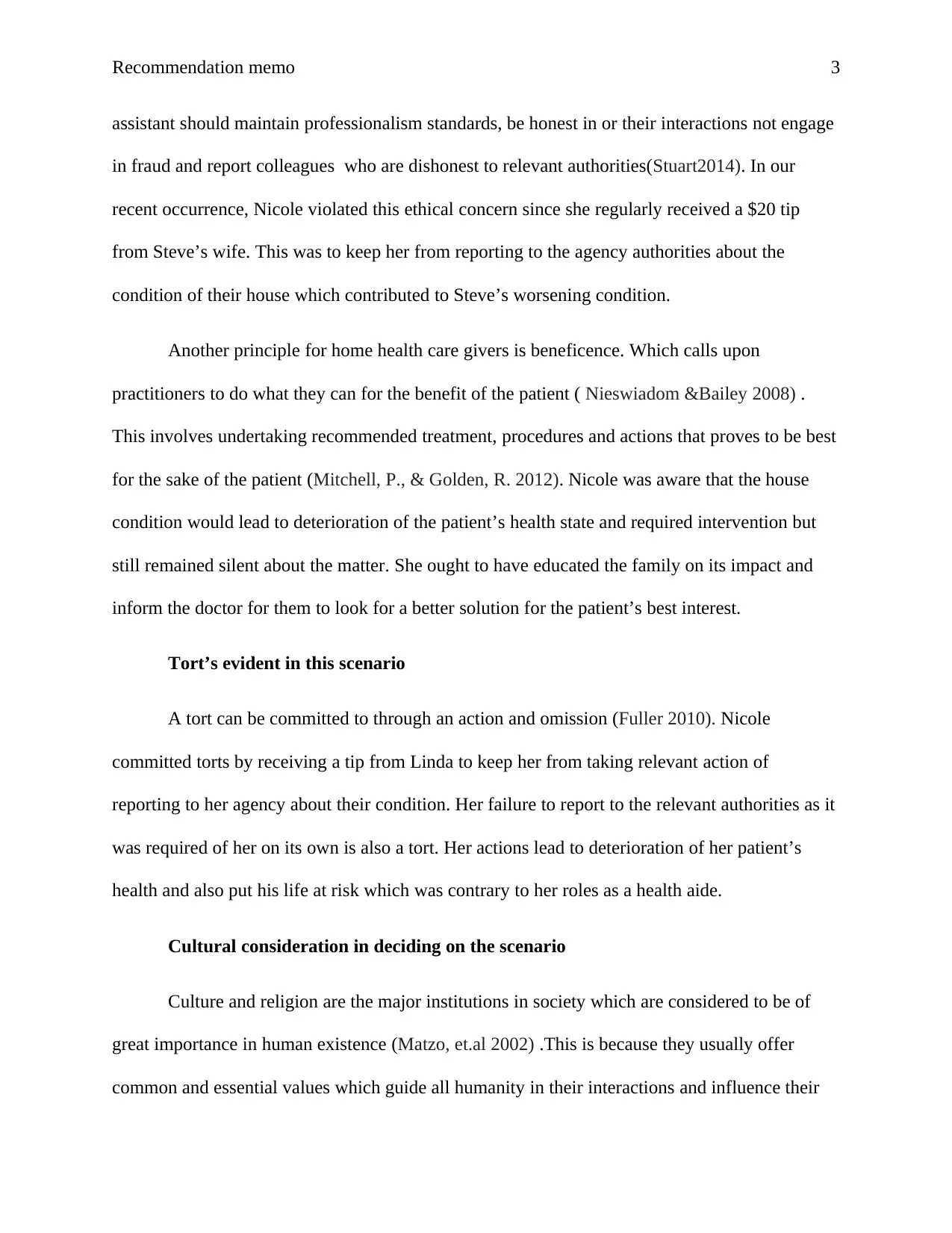
Recommendation memo 3
assistant should maintain professionalism standards, be honest in or their interactions not engage
in fraud and report colleagues who are dishonest to relevant authorities(Stuart2014). In our
recent occurrence, Nicole violated this ethical concern since she regularly received a $20 tip
from Steve’s wife. This was to keep her from reporting to the agency authorities about the
condition of their house which contributed to Steve’s worsening condition.
Another principle for home health care givers is beneficence. Which calls upon
practitioners to do what they can for the benefit of the patient ( Nieswiadom &Bailey 2008) .
This involves undertaking recommended treatment, procedures and actions that proves to be best
for the sake of the patient (Mitchell, P., & Golden, R. 2012). Nicole was aware that the house
condition would lead to deterioration of the patient’s health state and required intervention but
still remained silent about the matter. She ought to have educated the family on its impact and
inform the doctor for them to look for a better solution for the patient’s best interest.
Tort’s evident in this scenario
A tort can be committed to through an action and omission (Fuller 2010). Nicole
committed torts by receiving a tip from Linda to keep her from taking relevant action of
reporting to her agency about their condition. Her failure to report to the relevant authorities as it
was required of her on its own is also a tort. Her actions lead to deterioration of her patient’s
health and also put his life at risk which was contrary to her roles as a health aide.
Cultural consideration in deciding on the scenario
Culture and religion are the major institutions in society which are considered to be of
great importance in human existence (Matzo, et.al 2002) .This is because they usually offer
common and essential values which guide all humanity in their interactions and influence their
assistant should maintain professionalism standards, be honest in or their interactions not engage
in fraud and report colleagues who are dishonest to relevant authorities(Stuart2014). In our
recent occurrence, Nicole violated this ethical concern since she regularly received a $20 tip
from Steve’s wife. This was to keep her from reporting to the agency authorities about the
condition of their house which contributed to Steve’s worsening condition.
Another principle for home health care givers is beneficence. Which calls upon
practitioners to do what they can for the benefit of the patient ( Nieswiadom &Bailey 2008) .
This involves undertaking recommended treatment, procedures and actions that proves to be best
for the sake of the patient (Mitchell, P., & Golden, R. 2012). Nicole was aware that the house
condition would lead to deterioration of the patient’s health state and required intervention but
still remained silent about the matter. She ought to have educated the family on its impact and
inform the doctor for them to look for a better solution for the patient’s best interest.
Tort’s evident in this scenario
A tort can be committed to through an action and omission (Fuller 2010). Nicole
committed torts by receiving a tip from Linda to keep her from taking relevant action of
reporting to her agency about their condition. Her failure to report to the relevant authorities as it
was required of her on its own is also a tort. Her actions lead to deterioration of her patient’s
health and also put his life at risk which was contrary to her roles as a health aide.
Cultural consideration in deciding on the scenario
Culture and religion are the major institutions in society which are considered to be of
great importance in human existence (Matzo, et.al 2002) .This is because they usually offer
common and essential values which guide all humanity in their interactions and influence their
⊘ This is a preview!⊘
Do you want full access?
Subscribe today to unlock all pages.

Trusted by 1+ million students worldwide
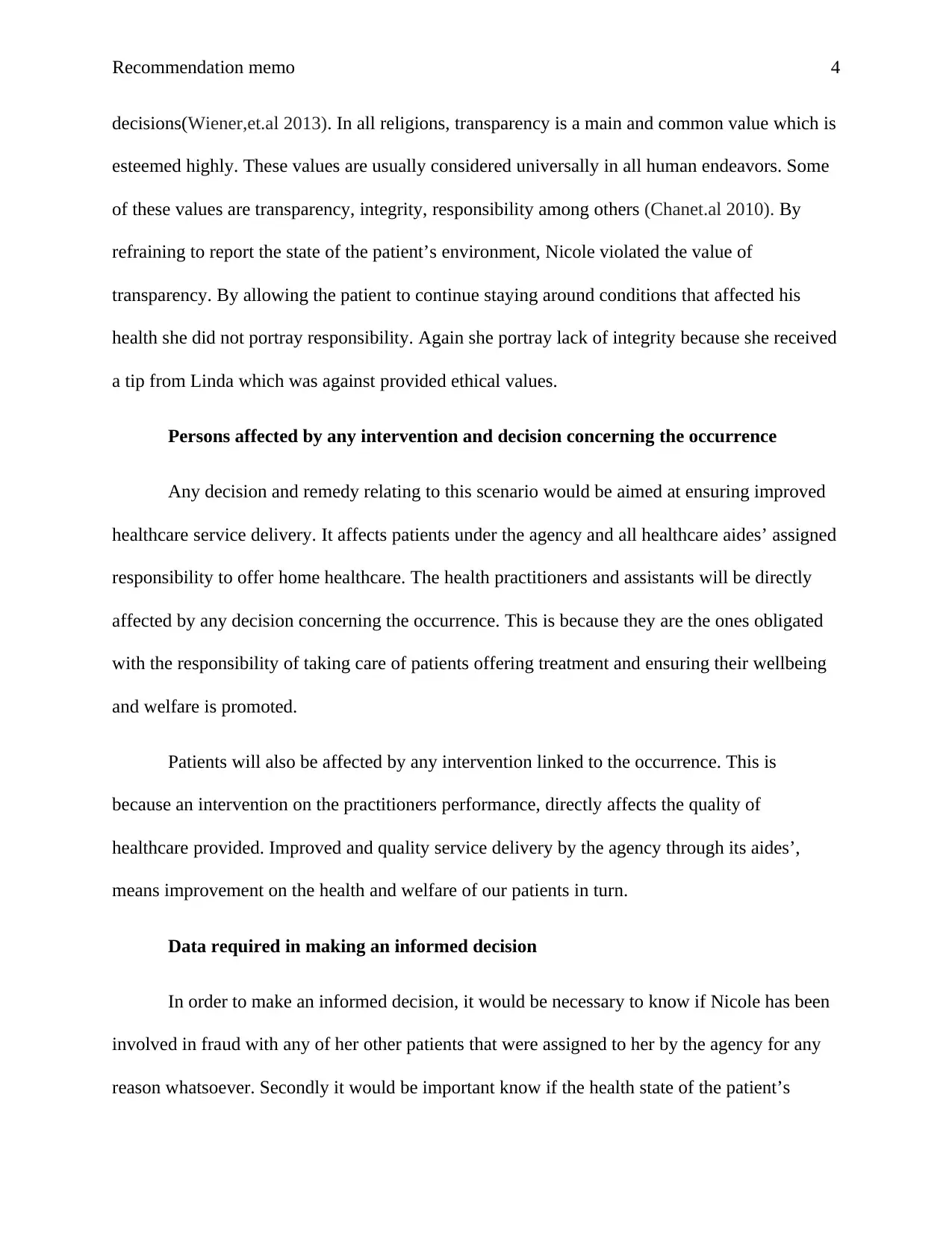
Recommendation memo 4
decisions(Wiener,et.al 2013). In all religions, transparency is a main and common value which is
esteemed highly. These values are usually considered universally in all human endeavors. Some
of these values are transparency, integrity, responsibility among others (Chanet.al 2010). By
refraining to report the state of the patient’s environment, Nicole violated the value of
transparency. By allowing the patient to continue staying around conditions that affected his
health she did not portray responsibility. Again she portray lack of integrity because she received
a tip from Linda which was against provided ethical values.
Persons affected by any intervention and decision concerning the occurrence
Any decision and remedy relating to this scenario would be aimed at ensuring improved
healthcare service delivery. It affects patients under the agency and all healthcare aides’ assigned
responsibility to offer home healthcare. The health practitioners and assistants will be directly
affected by any decision concerning the occurrence. This is because they are the ones obligated
with the responsibility of taking care of patients offering treatment and ensuring their wellbeing
and welfare is promoted.
Patients will also be affected by any intervention linked to the occurrence. This is
because an intervention on the practitioners performance, directly affects the quality of
healthcare provided. Improved and quality service delivery by the agency through its aides’,
means improvement on the health and welfare of our patients in turn.
Data required in making an informed decision
In order to make an informed decision, it would be necessary to know if Nicole has been
involved in fraud with any of her other patients that were assigned to her by the agency for any
reason whatsoever. Secondly it would be important know if the health state of the patient’s
decisions(Wiener,et.al 2013). In all religions, transparency is a main and common value which is
esteemed highly. These values are usually considered universally in all human endeavors. Some
of these values are transparency, integrity, responsibility among others (Chanet.al 2010). By
refraining to report the state of the patient’s environment, Nicole violated the value of
transparency. By allowing the patient to continue staying around conditions that affected his
health she did not portray responsibility. Again she portray lack of integrity because she received
a tip from Linda which was against provided ethical values.
Persons affected by any intervention and decision concerning the occurrence
Any decision and remedy relating to this scenario would be aimed at ensuring improved
healthcare service delivery. It affects patients under the agency and all healthcare aides’ assigned
responsibility to offer home healthcare. The health practitioners and assistants will be directly
affected by any decision concerning the occurrence. This is because they are the ones obligated
with the responsibility of taking care of patients offering treatment and ensuring their wellbeing
and welfare is promoted.
Patients will also be affected by any intervention linked to the occurrence. This is
because an intervention on the practitioners performance, directly affects the quality of
healthcare provided. Improved and quality service delivery by the agency through its aides’,
means improvement on the health and welfare of our patients in turn.
Data required in making an informed decision
In order to make an informed decision, it would be necessary to know if Nicole has been
involved in fraud with any of her other patients that were assigned to her by the agency for any
reason whatsoever. Secondly it would be important know if the health state of the patient’s
Paraphrase This Document
Need a fresh take? Get an instant paraphrase of this document with our AI Paraphraser
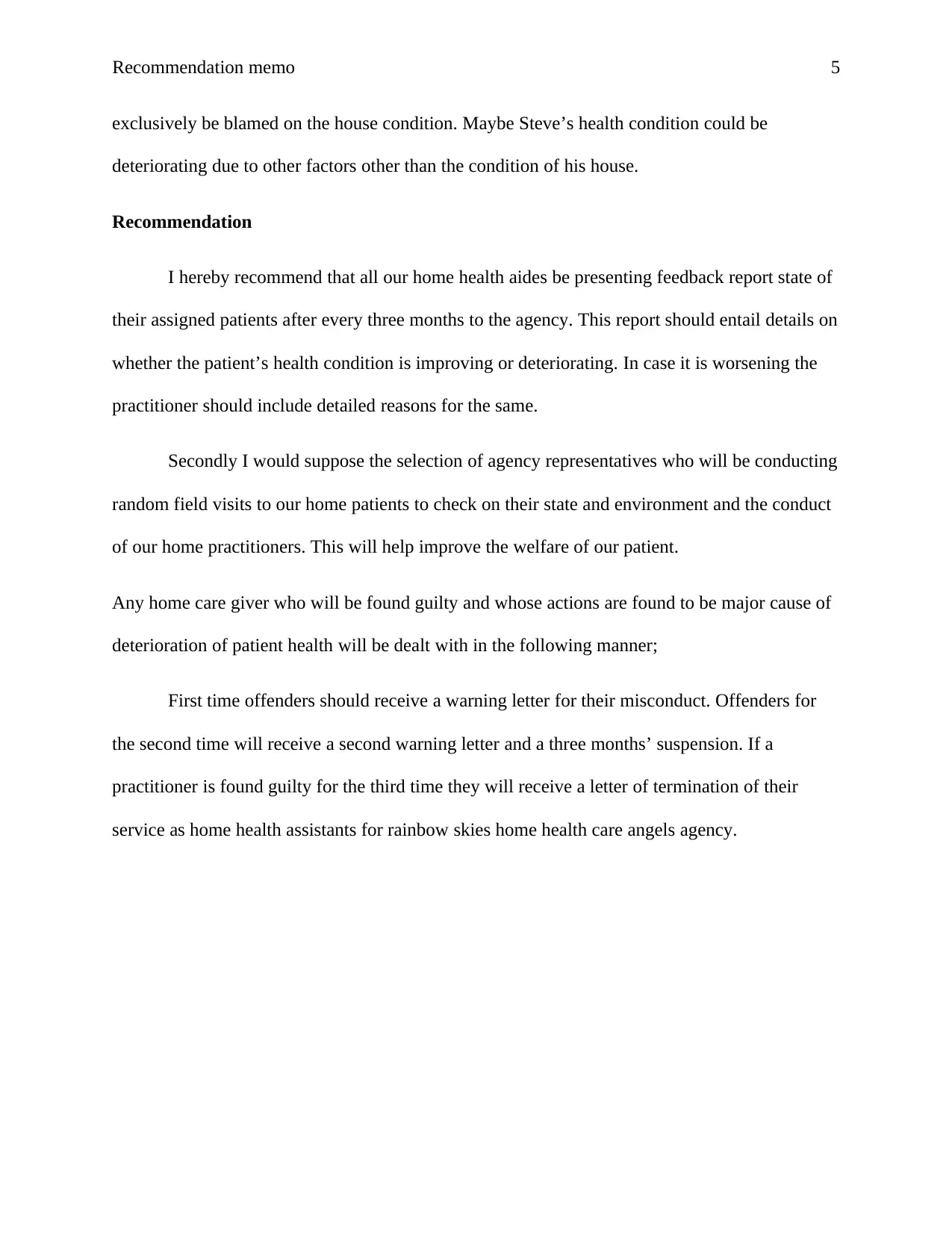
Recommendation memo 5
exclusively be blamed on the house condition. Maybe Steve’s health condition could be
deteriorating due to other factors other than the condition of his house.
Recommendation
I hereby recommend that all our home health aides be presenting feedback report state of
their assigned patients after every three months to the agency. This report should entail details on
whether the patient’s health condition is improving or deteriorating. In case it is worsening the
practitioner should include detailed reasons for the same.
Secondly I would suppose the selection of agency representatives who will be conducting
random field visits to our home patients to check on their state and environment and the conduct
of our home practitioners. This will help improve the welfare of our patient.
Any home care giver who will be found guilty and whose actions are found to be major cause of
deterioration of patient health will be dealt with in the following manner;
First time offenders should receive a warning letter for their misconduct. Offenders for
the second time will receive a second warning letter and a three months’ suspension. If a
practitioner is found guilty for the third time they will receive a letter of termination of their
service as home health assistants for rainbow skies home health care angels agency.
exclusively be blamed on the house condition. Maybe Steve’s health condition could be
deteriorating due to other factors other than the condition of his house.
Recommendation
I hereby recommend that all our home health aides be presenting feedback report state of
their assigned patients after every three months to the agency. This report should entail details on
whether the patient’s health condition is improving or deteriorating. In case it is worsening the
practitioner should include detailed reasons for the same.
Secondly I would suppose the selection of agency representatives who will be conducting
random field visits to our home patients to check on their state and environment and the conduct
of our home practitioners. This will help improve the welfare of our patient.
Any home care giver who will be found guilty and whose actions are found to be major cause of
deterioration of patient health will be dealt with in the following manner;
First time offenders should receive a warning letter for their misconduct. Offenders for
the second time will receive a second warning letter and a three months’ suspension. If a
practitioner is found guilty for the third time they will receive a letter of termination of their
service as home health assistants for rainbow skies home health care angels agency.
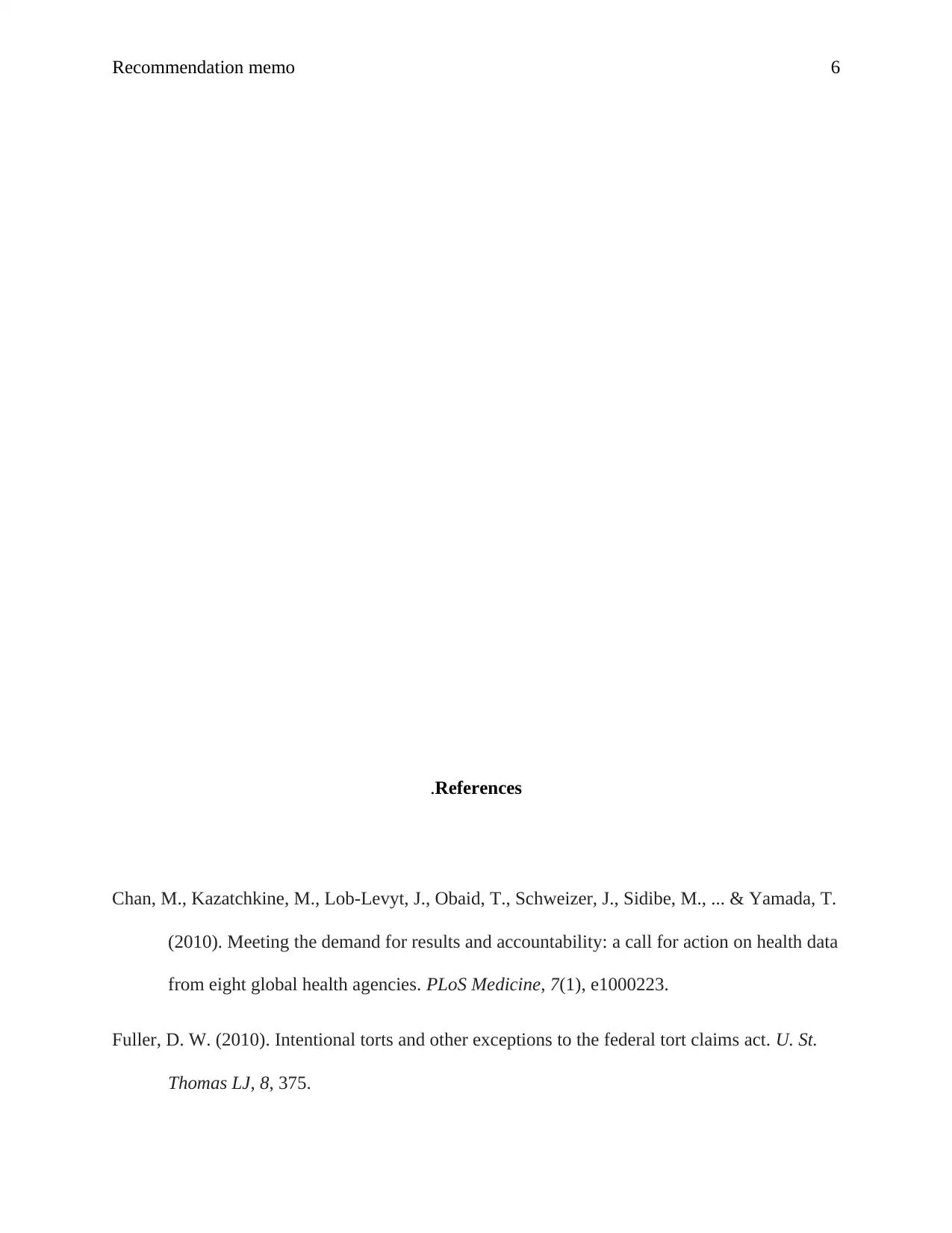
Recommendation memo 6
.References
Chan, M., Kazatchkine, M., Lob-Levyt, J., Obaid, T., Schweizer, J., Sidibe, M., ... & Yamada, T.
(2010). Meeting the demand for results and accountability: a call for action on health data
from eight global health agencies. PLoS Medicine, 7(1), e1000223.
Fuller, D. W. (2010). Intentional torts and other exceptions to the federal tort claims act. U. St.
Thomas LJ, 8, 375.
.References
Chan, M., Kazatchkine, M., Lob-Levyt, J., Obaid, T., Schweizer, J., Sidibe, M., ... & Yamada, T.
(2010). Meeting the demand for results and accountability: a call for action on health data
from eight global health agencies. PLoS Medicine, 7(1), e1000223.
Fuller, D. W. (2010). Intentional torts and other exceptions to the federal tort claims act. U. St.
Thomas LJ, 8, 375.
⊘ This is a preview!⊘
Do you want full access?
Subscribe today to unlock all pages.

Trusted by 1+ million students worldwide
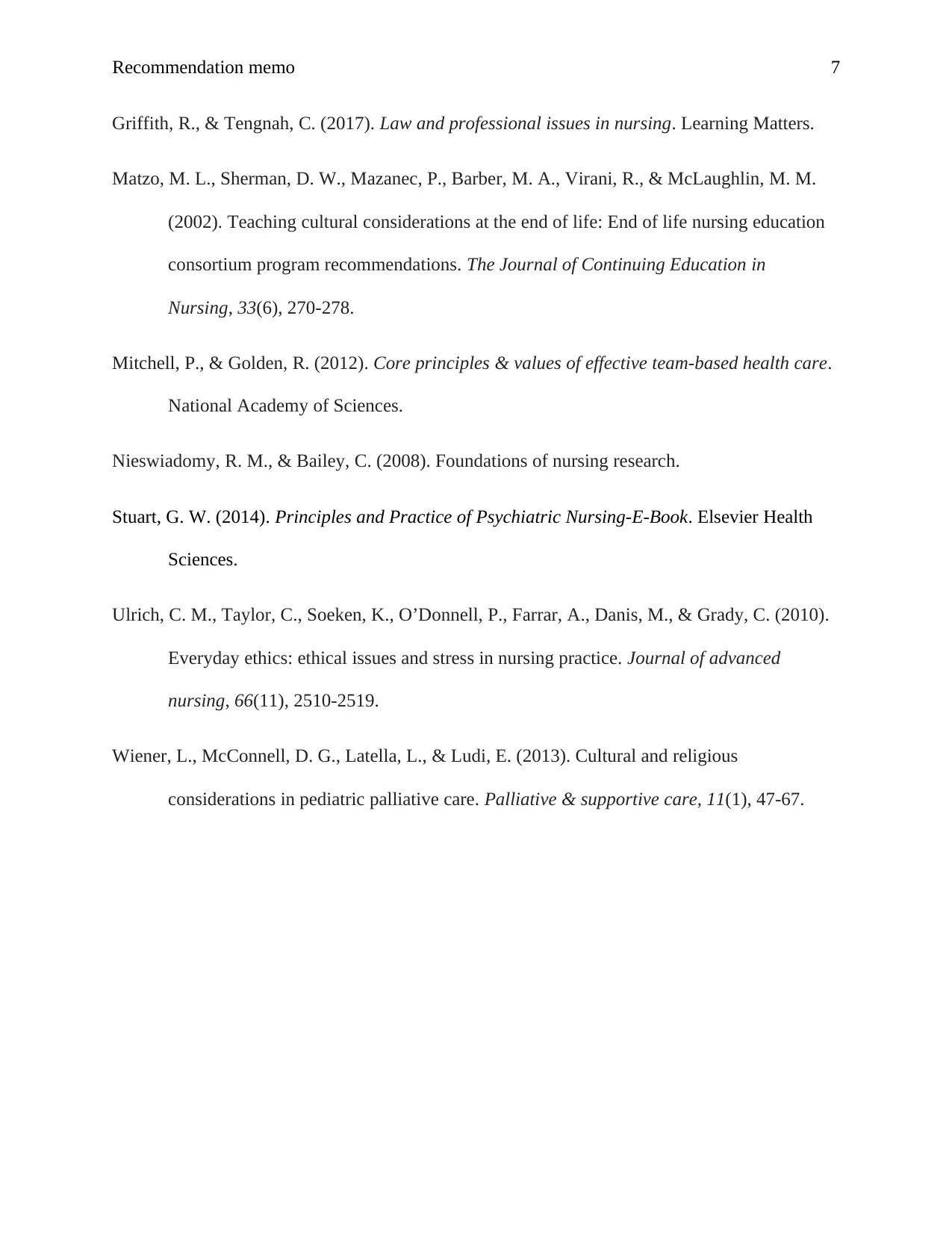
Recommendation memo 7
Griffith, R., & Tengnah, C. (2017). Law and professional issues in nursing. Learning Matters.
Matzo, M. L., Sherman, D. W., Mazanec, P., Barber, M. A., Virani, R., & McLaughlin, M. M.
(2002). Teaching cultural considerations at the end of life: End of life nursing education
consortium program recommendations. The Journal of Continuing Education in
Nursing, 33(6), 270-278.
Mitchell, P., & Golden, R. (2012). Core principles & values of effective team-based health care.
National Academy of Sciences.
Nieswiadomy, R. M., & Bailey, C. (2008). Foundations of nursing research.
Stuart, G. W. (2014). Principles and Practice of Psychiatric Nursing-E-Book. Elsevier Health
Sciences.
Ulrich, C. M., Taylor, C., Soeken, K., O’Donnell, P., Farrar, A., Danis, M., & Grady, C. (2010).
Everyday ethics: ethical issues and stress in nursing practice. Journal of advanced
nursing, 66(11), 2510-2519.
Wiener, L., McConnell, D. G., Latella, L., & Ludi, E. (2013). Cultural and religious
considerations in pediatric palliative care. Palliative & supportive care, 11(1), 47-67.
Griffith, R., & Tengnah, C. (2017). Law and professional issues in nursing. Learning Matters.
Matzo, M. L., Sherman, D. W., Mazanec, P., Barber, M. A., Virani, R., & McLaughlin, M. M.
(2002). Teaching cultural considerations at the end of life: End of life nursing education
consortium program recommendations. The Journal of Continuing Education in
Nursing, 33(6), 270-278.
Mitchell, P., & Golden, R. (2012). Core principles & values of effective team-based health care.
National Academy of Sciences.
Nieswiadomy, R. M., & Bailey, C. (2008). Foundations of nursing research.
Stuart, G. W. (2014). Principles and Practice of Psychiatric Nursing-E-Book. Elsevier Health
Sciences.
Ulrich, C. M., Taylor, C., Soeken, K., O’Donnell, P., Farrar, A., Danis, M., & Grady, C. (2010).
Everyday ethics: ethical issues and stress in nursing practice. Journal of advanced
nursing, 66(11), 2510-2519.
Wiener, L., McConnell, D. G., Latella, L., & Ludi, E. (2013). Cultural and religious
considerations in pediatric palliative care. Palliative & supportive care, 11(1), 47-67.
1 out of 7
Your All-in-One AI-Powered Toolkit for Academic Success.
+13062052269
info@desklib.com
Available 24*7 on WhatsApp / Email
![[object Object]](/_next/static/media/star-bottom.7253800d.svg)
Unlock your academic potential
Copyright © 2020–2026 A2Z Services. All Rights Reserved. Developed and managed by ZUCOL.